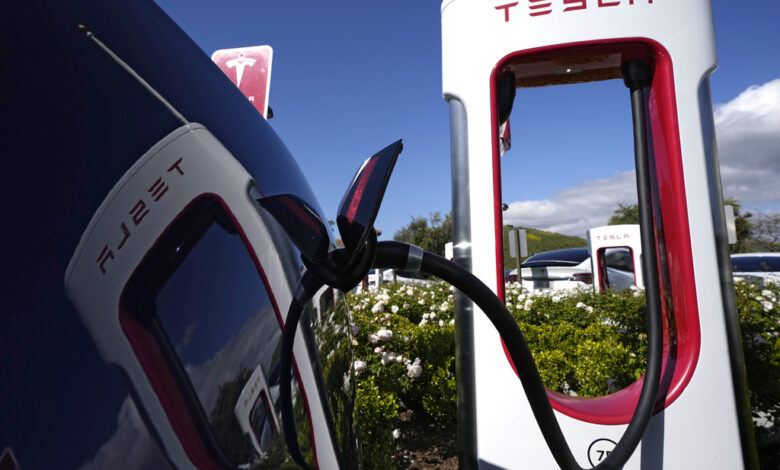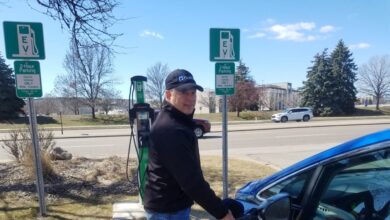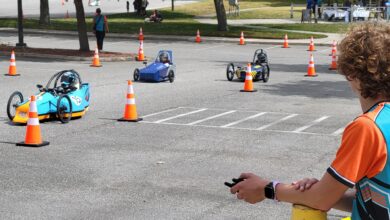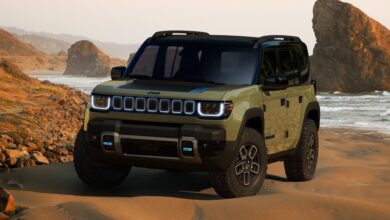Over 50 locations across Wisconsin selected for federally funded EV charging stations

More than 50 locations across Wisconsin will host new federally funded high-speed electric vehicle stations.
Gov. Tony Evers announced Thursday the state Department of Transportation awarded $23.3 million out of more than $78 million in federal funding to support 53 fast charging projects. The number of charging stations at each site will vary.
Construction could begin this summer, with the goal of having most projects completed and operational in 2025.
Stay informed on the latest news
Sign up for WPR’s email newsletter.
The recipients in the first round of funding, selected from more than 260 applicants, include 24 Kwik Trip stores, Oneida Casino, Potawatomi Fire Side Market, several other gas station chains, hotels, box stores, restaurants and other businesses.
The sites are located along the state’s Alternative Fuel Corridor, a linkage of interstate highways, U.S. highways and a state highway that connects the eastern and western parts of Wisconsin. The locations selected in this first round of funding vary from suburban communities, like Wauwatosa, to rural communities like Rhinelander.
“We really wanted a Wisconsinite who lives in the southern third of Wisconsin or someone who lives up north to be able to travel the entire state with an electric vehicle and not have concerns about where they’re going to be able to travel,” said Kaleb Vander Wiele, transportation electrification project manager for the state DOT.
Officials said the chargers will support the more than 23,000 electric vehicles registered in the state, along with people visiting from out of state.
Ben Behlke, clean technology manager for RENEW Wisconsin, said the sites selected in this first round of funding will go a long way toward addressing the “range anxiety” many EV owners have. He said he was happy DOT’s site selection was “expansive across the state.”
He said many EV owners plan their trips around where they’ll be able to charge their vehicle, and the time it’ll take to charge. He said most of the publicly available chargers in Wisconsin are relatively slow and these 53 sites with fast charging will help address that.
“Having this infrastructure soon to be put in place, I think, really alleviate some of that stress for people where they can really make a better decision for themselves of if electric vehicles make sense,” he said. “I think this is just a really big step forward to EV adoption. It’s really going to make it a lot easier for people.”
A DOT spokesperson said in January that Wisconsin had 578 publicly accessible stations with 1,373 total ports, 90 of which have high-speed chargers. Using federal funds to expand that network required a state law change to prevent the government-funded stations from being regulated as utilities.
The state DOT said the new projects have an estimated total cost of $33.8 million, including $23.3 million in federal funds and $10.5 million in private funding. The federal program requires applicants provide at least a 20 percent match to the government dollars.
During the application process, DOT considered multiple factors when choosing which projects would receive funding. Some of the criteria included their potential for future development, parking availability and extended business hours to account for longer refueling times.
Vander Wiele said so many Kwik Trips were selected in the first round of funding because the company was “very cost efficient” in its estimates of the money needed to build charging stations at their locations. He said the company’s “substantial footprint across the state” also factored into its awards.
“One of the things we looked for, again, in our application process was placement in disadvantaged communities,” Vander Wiele said. “We looked for how those entities were going to engage communities in the process of developing these projects, and Kwik Trip was very strong in those portions of their applications as well.”
Kwik Trip spokesperson Ben Liebl said the company is excited to partner with the state DOT and is thankful to have been selected for the program.
“We are thrilled to bring EV charging to our guests,” he said in an email.
Vander Wiele also said the charging stations planned for Oneida Casino in Green Bay and Potawatomi Fire Side Market in Crandon were the first tribal nations to receive funding through the federal program. The two projects will receive more than $800,000.
“We wanted to be able to effectively serve communities in that region of the state,” Vander Wiele said. “Tribal organizations have been an active part of our stakeholder engagement, understanding that they can be key partners in helping us serve some of those communities.”
Wisconsin will receive $78 million over five years from the federal government for expanding electric vehicle charging. The state Department of Transportation says it is evaluating opportunities to invest the remaining $55 million.
Behlke said the first round of funding touching each region in Wisconsin will help state leaders better plan for where they place additional chargers.
“We can look at the data and see which chargers are being used and which chargers aren’t, and where they’re more needed and where they’re not more needed,” he said. “I think that we’re gonna get to a point where we can be very strategic about where we put the funds.”
Wisconsin Public Radio, © Copyright 2024, Board of Regents of the University of Wisconsin System and Wisconsin Educational Communications Board.



